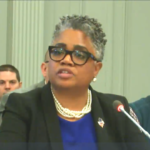
With a Nod to Grandma, Here’s a Question About Lakewood
September 28, 2023
Murphy’s Education Department Announces Anti-Bullying Public Hearings
September 29, 2023New Jersey Public Charter Schools Association Explains It All
The New Jersey Public Charter Schools Association (NJPCSA) announced the release of its 2023 statewide fact sheet, “Get the Facts: New Jersey’s Public Charter Schools”. This fact sheet underscores the importance of charter schools in New Jersey’s public education landscape, particularly in our most economically challenged communities where educational opportunities and safe and secure school buildings for students must be prioritized. Currently, public charter and renaissance schools serve one in five students in our 31 former Abbott/SDA districts.
This fact sheet should serve as a valuable resource for policymakers, educators, parents, and the broader community seeking to understand their positive contributions public charter schools are making in the Garden State, as well as the challenges they continue to face.
Harry Lee, President and CEO of NJPCSA, summarized: “This fact sheet highlights the tremendous contributions our schools are making, as well as the funding inequities that exist. With over 60,000 students attending public charter schools throughout the Garden State, we must ensure that every child has access to a safe, secure and welcoming school building so that they have the tools and resources to reach their full potential. Charters continue to lead the way by closing equity gaps, providing a great education, and empowering students and staff from diverse backgrounds. As we work to ensure every child receives an excellent education, public charter schools will continue to play a vital role in the overall landscape of New Jersey’s public education system.”
T.J. Best, Senior Advisor for NJPCSA, added, “Public charter schools are proud to be the most accountable schools in New Jersey. Sharing our yearly data in an easy-to-understand manner is yet another way we are putting our students’ educational outcomes at the forefront. It is also a way to keep parents in the driver’s seat of their children’s education, which we know leads to better outcomes. The more information at their disposal, the easier it is for parents to advocate for their children, families, and communities.”
Key Findings from the Fact Sheet:
About Public Charter Schools: Charter schools are free, nonprofit public schools open to all students. They operate with increased flexibility to meet the diverse needs of students and families, while adhering to rigorous financial, academic, and operational standards.
Statewide Presence: New Jersey boasts 85 charter schools in 44 cities and 18 counties, serving over 60,000 students. And as parents continue to select the public school that best meets their child’s needs, there are still 28,000 students on charter school waitlists, underscoring demand for high quality public school options.
Academic Excellence: Black, Latino, and low-income students in New Jersey’s public charter schools consistently outperform their district and statewide counterparts. On average, they achieve 15 percentage points higher in English Language Arts and 9 points higher in Math, compared to their district peers. Overall, public charter school students in New Jersey are 43% more likely to read at grade level and 49% more likely to perform at grade level in math.
Underfunding Challenge: Public charter schools in New Jersey receive less per pupil funding compared to traditional district schools, and they have also been excluded from nearly all state funding for school facilities, forcing them to spend approximately $1,500 per student on their buildings, dollars that could better serve teachers and students in the classroom.
Exceptional Student Gains: Newark boasts one of the top charter school sectors in the nation, and Newark public charter school students consistently outpace the state average, gaining 48 additional instructional days per year in reading instruction and 73 additional days per year in math when accounting for individual student characteristics.
Autonomy and Diversity: Public charter schools enjoy more autonomy over budgets, curriculum, and personnel, allowing for creative approaches to meet individual student needs. A wide array of learning models showcase the diversity within the charter school landscape, including:
- Hoboken Dual Language Charter School, which provides an exceptional education in Spanish and English to develop engaged, well-rounded bilingual citizens with a global and multicultural perspective.
- College Achieve (CAPS) Greater Asbury Park Charter School, which serves 95% Black and Latino students, and had the third largest gains in the state last year in English Language Arts (ELA), significantly outperforming peers throughout the state.
- Unity Charter School in Morristown, which infuses Education for Sustainability throughout its school culture. Student agency drives critical thinking and inspires advocacy through a constructivist learning approach so that students graduate ready to change the world for the better.
To access the full fact sheet and learn more about New Jersey’s public charter schools, please visit www.njcharters.org.




